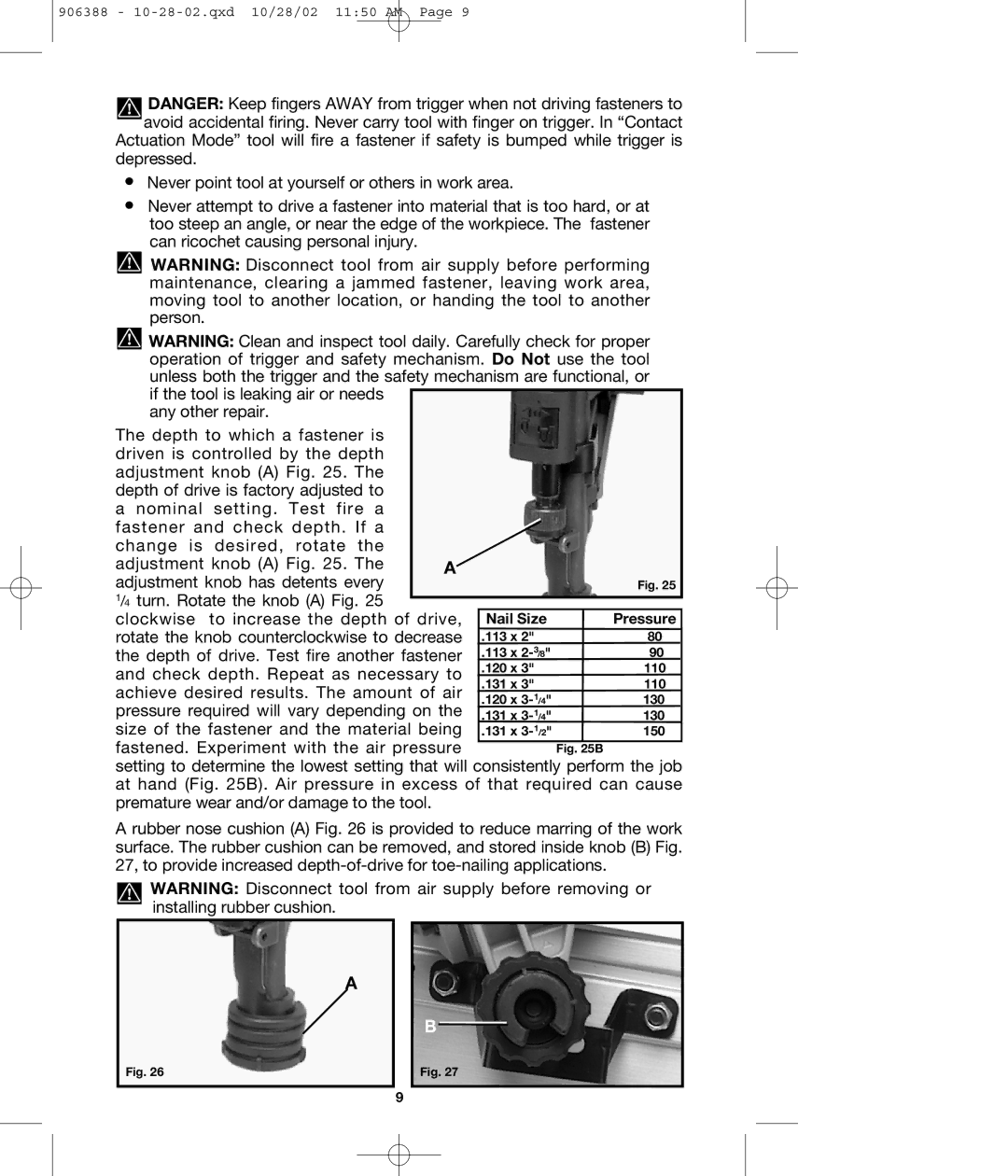
906388 - 10-28-02.qxd 10/28/02 11:50 AM Page 9
DANGER: Keep fingers AWAY from trigger when not driving fasteners to avoid accidental firing. Never carry tool with finger on trigger. In “Contact Actuation Mode” tool will fire a fastener if safety is bumped while trigger is
depressed.
Never point tool at yourself or others in work area.
Never attempt to drive a fastener into material that is too hard, or at too steep an angle, or near the edge of the workpiece. The fastener can ricochet causing personal injury.
![]() WARNING: Disconnect tool from air supply before performing maintenance, clearing a jammed fastener, leaving work area, moving tool to another location, or handing the tool to another person.
WARNING: Disconnect tool from air supply before performing maintenance, clearing a jammed fastener, leaving work area, moving tool to another location, or handing the tool to another person.
![]() WARNING: Clean and inspect tool daily. Carefully check for proper operation of trigger and safety mechanism. Do Not use the tool unless both the trigger and the safety mechanism are functional, or if the tool is leaking air or needs
WARNING: Clean and inspect tool daily. Carefully check for proper operation of trigger and safety mechanism. Do Not use the tool unless both the trigger and the safety mechanism are functional, or if the tool is leaking air or needs
any other repair.
The depth to which a fastener is |
|
|
|
|
driven is controlled by the depth |
|
|
|
|
adjustment knob (A) Fig. 25. The |
|
|
|
|
depth of drive is factory adjusted to |
|
|
|
|
a nominal setting. Test fire a |
|
|
|
|
fastener and check depth. If a |
|
|
|
|
change is desired, rotate the |
|
|
|
|
adjustment knob (A) Fig. 25. The | A |
|
|
|
adjustment knob has detents every |
|
| Fig. 25 | |
1/4 turn. Rotate the knob (A) Fig. 25 |
|
|
|
|
|
|
|
| |
clockwise to increase the depth of drive, | Nail Size | Pressure |
| |
rotate the knob counterclockwise to decrease | .113 x 2" | 80 |
| |
the depth of drive. Test fire another fastener | .113 x | 90 |
| |
and check depth. Repeat as necessary to | .120 x 3" | 110 |
| |
achieve desired results. The amount of air | .131 x 3" | 110 |
| |
.120 x | 130 |
| ||
pressure required will vary depending on the | .131 x | 130 |
| |
size of the fastener and the material being | .131 x | 150 |
| |
fastened. Experiment with the air pressure |
|
|
| |
| Fig. 25B |
| ||
setting to determine the lowest setting that will consistently perform the job at hand (Fig. 25B). Air pressure in excess of that required can cause premature wear and/or damage to the tool.
A rubber nose cushion (A) Fig. 26 is provided to reduce marring of the work surface. The rubber cushion can be removed, and stored inside knob (B) Fig. 27, to provide increased
WARNING: Disconnect tool from air supply before removing or installing rubber cushion.
A
Fig. 26
B![]()
Fig. 27
9
